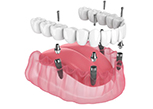Dentures – Phoenix, AZ
Restoring All of Your Missing Teeth
The gaps in your smile are not your biggest concern when your teeth are missing (although they can be embarrassing); your diet will be more limited, and people may have a harder time understanding you when you talk. Dr. Jafari and Dr. Ferreira are here to make sure that you don’t have to live with missing teeth any longer than necessary. The dentures are very lifelike and can improve the function of your smile. Call us to learn more about this time-tested way to replace lost teeth!
Why Choose Bell Road Dental Care of Phoenix for Dentures?
- Prosthetic Teeth Made from Lifelike, Long-Lasting Materials
- Entire Dental Implant Procedure Performed In-House
- Comfortable, Privately-Owned Office
Who’s a Good Candidate for Dentures?

You don’t necessarily need to be missing all your teeth to be considered a candidate for dentures; they can still be a good option if you ever find yourself with multiple gaps in your grin. Though not everyone is a good fit for dentures, almost anyone can be! Because of their versatility and their ease of access, millions of Americans choose them to treat tooth loss every year. But what makes a good candidate for dentures at Bell Road Dental Care of Phoenix? Continue reading below to find out.
Effects of Missing Teeth

Missing teeth affect more than just your appearance. The longer you wait to replace them, the greater the risk for irreversible damage to your other teeth and jawbone. Tooth roots are the main source of stimulation for the jawbone, keeping it strong and dense. The more teeth you have missing, the weaker the bone becomes, shrinking over time.
Tooth loss from accidents and severe decay can cause teeth to shift, changing the way your pearly whites fit together. This can cause damaged enamel, bruxism (teeth grinding), and contribute to temporomandibular joint pain. So, there are many reasons not to wait, even if you’re young. Dentures aren’t only for seniors!
What Qualifies You for Dentures?

Anyone with healthy gums and sufficient density in their jawbone can get dentures. They are an adaptable treatment, so it doesn’t matter how many teeth you’re missing or where. Whether you have a few in different places or have lost a whole dental arch, there's a prosthetic that can help restore your smile.
To truly determine what’s best for you, the process begins with a consultation. Our team will assess your oral health, talk about your goals and expectations, and walk through your finances to get a better picture of your situation. With this information in hand, we can find the best solution for your needs.
Alternative Tooth-Replacement Options

If, after your consultation, you decide that dentures aren’t a great fit for your goals, your dentist will recommend other options. Dental bridges and implants are two great examples of alternative tooth replacements.
- Dental Bridge: For patients only missing a couple of consecutive teeth, bridges offer an economical option. Your dentist will first shape healthy teeth on either side of the gap. Next, crowns supporting a false tooth (pontic) are placed over the shaped teeth and bonded in place. This creates a single prosthetic that blends seamlessly into your smile.
- Dental Implants: These are titanium posts surgically placed into your jawbone to serve as anchor points for prosthetics. You’ll need a healthy jawbone to support implants, but they are the strongest tooth replacement available and even keep your jawbone from degrading over time!
If you’re ready to give dentures a chance, contact us at Bell Road Dental Care of Phoenix to schedule your consultation.
Types of Dentures

If we decide dentures are a good fit for you, one of the first things we’ll need to determine is the kind you should get. Major factors usually include the number of teeth missing and your candidacy for dental implant surgery. Based on our findings, we will suggest one of the following options.
Partial Dentures
Partial dentures are used when only some of the teeth are missing, and as such they can come in different shapes and sizes. They fit neatly in the gaps that need to be filled, and they use clasps to stay in place.
Full Dentures
Full dentures will be recommended if you have already lost all of your teeth or if you only have a few teeth left (which will need to be extracted before you receive your prosthesis). Full dentures don’t have clasps; instead, natural suction keeps them seated on the gums.
Implant Dentures
Implant dentures are in no danger of slipping since they’re attached to implant posts anchored to your jaw. And unlike traditional dentures, they can help prevent bone loss. The number of implants needed for dentures depends on the situation; for example, full dentures might require four to eight implant posts.
How Dentures Are Made

Knowing how dentures are made will help you to become more appreciative of your new smile. These uniquely designed prosthetics deliver greater function and aesthetics than living with missing teeth, but they do require much attention and precision when moving through the creation process. If you would like to learn more about how these artificial pearly whites form to create a beautiful new smile, keep reading.
What Are Dentures Made Of?

There are two pieces that work together to create a complete denture – the base and the artificial teeth.
- The Base – No matter if it’s a partial or full denture, it must have a base. This is what keeps the teeth in position and creates the foundation for your new smile. Commonly made out of acrylic, it is matched to resemble the natural gum color so that it blends in beautifully with your existing smile.
- Artificial Teeth – The artificial teeth that exist on top of the base are crafted from porcelain or acrylic and mimic the look of real pearly whites. Capable of withstanding normal daily wear and tear, these teeth are durable and natural in appearance.
The Denture Creation Process

The process of creating dentures starts with an impression of your mouth. After capturing the shape and arrangement of your gums and remaining teeth (if there are any), we will send them off to a dental lab, where technicians will create a wax model of your dentures. Our team will then evaluate how it fits, its appearance, and how it functions before the final denture is created. The bite alignment, tooth shade, size, and shape are all determined before the wax model is sent back to the lab for further creation.
It is during this time that you will be provided with temporary dentures that you can wear. This will allow you to become familiar with how dentures feel when worn and how to use them in everyday life.
The wax model is placed into a flask that holds plaster that is poured in to form the shape of your dentures. The flask is then placed in hot water so that the wax melts. Acrylic is then injected into the flask to replace the wax, and the plaster is removed once the acrylic dentures are placed in an ultrasonic bath. After giving the dentures a final polish and cutting any excess acrylic away, the dentures are ready for our team to receive so that you can undergo a fitting.
Adjusting to Your New Dentures

It’s natural for it to take time to adjust to your new dentures, as these are foreign objects that your lips, cheeks, and tongue must become accustomed to. Some common adjustments you can expect include:
- Soreness in the beginning, as your jaw and gums must get used to the new teeth that are in place. This can be remedied with OTC pain reliever and a cold compress.
- Speech impediment that can be improved with slow speech and spending time practicing certain words and syllables.
- Eating habits, as you’ll want to start by consuming soft foods to minimize the amount of pressure placed on your dentures as you learn to eat properly so that they do not fall out.
The Benefits of Dentures

Tooth loss can really get in the way of everyday life. Based on its severity, you could struggle to eat, speak, or even smile with confidence. That said, dentures could easily resolve the problem of your missing teeth. They can restore your full smile and improve your quality of life. In fact, our office will gladly tell you more about the benefits of dentures. Simply keep reading or call us directly for more details.
Psychological Benefits

Tooth loss tends to ruin a patient’s mood. To be specific, it makes its sufferers feel insecure and ashamed of their looks. Such feelings can lead you to withdraw from social life and become self-critical. If that process isn’t curbed, you could fall into severe sadness or clinical depression.
Of course, dentures help you avoid a negative outlook by restoring your grin. They fill your so-called “smile gaps” and leave you more confident as a result. That way, you won’t have to worry about your looks, how you eat, or how you speak. You can just enjoy the company of your close friends and family.
Clearer Enunciation

Yes, a full smile is needed for clear speech. Without most (if not all) of your teeth, your tongue won’t have the support to enunciate words well. You’d just end up talking with speech impediments – lisps, slurred words, etc.
Thankfully, dentures are designed from the get-go to treat tooth loss. They can easily fill the gaps in your grin like natural teeth. Therefore, these devices will support your tongue enough to enunciate words. You’d simply need to practice with them for a few weeks first.
Improves Nutrition

Unless you treat them, missing teeth tend to result in a poor diet. Each tooth helps you chew food, so even losing a few can force you to give up healthy-but-tough meals. You’d then be at a much higher risk of malnutrition and indigestion.
All that said, wearing dentures lets you skip the nutrition problem. Relying on these artificial teeth lets you chew a wider range of food. Therefore, their use should expand your dietary choices and improve your nutrition.
Preserves Oral Health

Losing teeth causes the rest of your smile to suffer over time. As the condition advances, it creates “smile gaps” that let harmful bacteria build up over time. It could then tilt the rest of your natural teeth until these other ones fall out.
Even so, dentures defend against this oral damage by filling your smile gaps. Their artificial teeth can get rid of your mouth’s new empty spaces and keep nasty bacteria at bay. Plus, their weight will at least slow the tilting rate of your other teeth.
Expands Opportunities

Certainly, having a truly beautiful smile helps with a first impression. Being able to show off your gorgeous grin makes peers view you in a better light. As that happens, the goodwill you receive can take the form of opportunities – amazing friendships, lovely dates, high-paying work, etc.
Dentures give your mouth the pretty smile needed for good first impressions. By wearing them, you’ll have a gorgeous grin that draws admiration and positive feelings. Your friends, family, coworkers, and others will then want to share good opportunities with you. These positive connections will ultimately lead to excellent outcomes.
Understanding the Cost of Dentures

You’ll want to learn dentures’ price before you commit to them. (You can’t buy a treatment if it’s outside your price range.) However, note that the cost of dentures varies by patient. You can only get a precise estimate by consulting our dentists. From there, our dental team will strive to make your dentures affordable. We’ll thus explain your treatment’s cost factors and payment options. To learn more, just keep reading or call us soon.
Factors That Affect the Cost of Dentures

Before you get dentures, our office will perform an oral exam. Doing so lets us review factors that affect your dentures’ cost. These elements are:
- Preparatory Work – In some cases, a patient needs preliminary services before getting dentures. (Such procedures can span tooth removal, gum disease therapy, etc.) Your expenses will rise if you require such things.
- Acrylic Base Type – Denture bases use varying kinds of acrylic. Depending on the type, your prosthetics may be inexpensive or costly.
- Replacement Teeth Material – Artificial denture teeth use acrylic or porcelain. The cost is low with acrylic ones, but the results are short-lived. Meanwhile, porcelain teeth get pricey but last longer.
Along with the points above, remember: low-cost dentures aren’t good. These kinds tend to use inferior acrylic and poor tooth materials. That being said, ensure your chosen dentures are high quality.
Are Implant Dentures More Expensive?

In terms of upfront price, implant dentures do cost more. Even so, the restorations have upsides that justify their price.
Firstly, implant dentures rely on dental implants. The latter objects are set in your jaw and slowly fuse with it once placed. Over time, they’ll make the denture permanent and keep it from slipping or falling. You’ll then attain a grin that blends seamlessly with adjacent teeth.
Plus, an implant denture is a good investment. Its implants can last for over 30 years with good care. In other words, its lifespan often goes past those of other options. (A regular denture only lasts for 5-7 years.) Thus, an implant denture doesn’t need as many repair or replacement visits. It’ll save you money otherwise spent on follow-up care.
Does Dental Insurance Cover Dentures?

As a matter of fact, yes – dental insurance does cover dentures. Most plans see the restorations as necessary for tooth loss. Therefore, they usually cover up to 50% of a denture’s cost.
All that said, there are exceptions. A given dental plan may have limited coverage or none at all. To compensate, confirm your benefits before treatment. Our dental team will gladly help you do so.
Other Options for Making Dentures Affordable

Besides insurance, there are other ways to make dentures affordable. Notable ones are a practice’s payment options. With the right kind, your final dentures won’t break the bank.
For instance, just look at Bell Road Dental Care. We offer:
- In-House Savings Plans – For an annual fee, our practice will give you (among other things) 20% off of denture treatment.
- Flexible Financing – Our office works with CareCredit, a reputable third-party financier. Through them, you could pay for dentures in monthly installments.
In the end, our office wants to give you effective and budget-friendly dentures. Find out how to finance them by visiting our practice in the coming days.
Dentures Aftercare

A new set of dentures can transform the way your smile looks and works, but your appliance will only stay in good condition if you take excellent care of it. Proper oral hygiene and regular checkups at our Phoenix office are still essential even if you have lost all your natural teeth because they allow us to monitor your oral health, adjust your restoration as needed, and address problems in their early stages. Here’s a brief guide to how you can keep your dentures in great shape, but please contact our office if you would like to know more.
Removable Dentures

Remove After Eating
Removing and rinsing your dentures after every meal is a great way to prevent the accumulation of plaque and food residue. Never use hot water, as the heat can warp your dentures and ruin the way they fit.
Clean Your Restoration
Remove your dentures before cleaning them with a soft-bristled toothbrush and a little bit of denture cleanser, mild dish soap, or unscented hand soap. Normal toothpaste is too abrasive for dentures and can leave unsightly scratches on their surface. If you’re not putting your dentures back in immediately, soak them in a vessel of water or denture-cleansing solution to prevent them from drying out and warping.
Keep Your Dentures Safe
It’s best to keep your dentures out of reach of small children and pets. When cleaning your dentures, place folded towels across your countertop and fill your sink with lukewarm water to create a cushion in case you drop them.
Remove Dentures When You Sleep
Continuous denture wear reduces blood flow to your gums, which leads to soft-tissue irritation and infections. Always remove and soak your dentures before going to bed to prevent your appliance from warping while your mouth rests and cleans itself. Wearing dentures for too long has also been associated with bad breath and pneumonia.
Notice Changes
Pay attention to how your dentures work and look and report anything unusual to our dentist. Never attempt to repair or adjust damaged dentures on your own, as you may injure yourself or damage the appliance further. Be on the lookout for signs that your dentures are not fitting properly such as shifting, clicking, or popping, as your appliance may need to be relined or replaced.
All-on-4 Dentures

Use a soft-bristled or electric toothbrush with non-abrasive toothpaste to clean your dentures twice a day. Avoid toothpaste with baking soda or stain-removing agents, as these can leave scratches on your appliance. It’s also important to floss your dentures twice daily, and floss threaders may help you clean beneath your appliance. Many patients find that water flossers make it much easier for them to keep their restorations and implants clean. Sulcus brushes that are one-third the width of normal toothbrushes can be excellent for cleaning between your gums and your dentures, and it’s also crucial to use antibacterial mouthwash daily to prevent the development of tartar.
Dentures FAQs
How Long Does It Take to Get Dentures?
Unlike dental crowns and bridges, which usually only take a few weeks to fabricate, getting dentures involves a more intricate process with at least one or two fittings. Also, if you are getting implant dentures, the overall process requires a longer preliminary stage. As a result, the timeline varies greatly from patient to patient. It could take anywhere between a month and a year to complete treatment. During your consultation, we can give you a clearer timeline based on your individual needs.
Does Getting Dentures Hurt?
No, the process of restoring your smile doesn’t hurt. You may experience some slight discomfort at certain stages, such as if you need a tooth extraction or when implants are placed. Also, there is a temporary adjustment period when you first wear your new dentures where you need some time to get used to your new teeth. However, there shouldn’t be any pain. If you do experience it or any other unpleasant symptoms at any point, let us know.
Are There Diet Restrictions for Dentures?
With traditional or implant dentures, you may eat basically whatever your bite can handle. For many patients with normal dentures, tough or hard foods (such as steak or corn on the cob) must be cut up into small pieces to make chewing easier and digestion more comfortable. Over time, you may find it more challenging to eat, which is a sign that your dentures need to be adjusted or replaced. With implant dentures, however, you should be able to eat anything you like.
How Long Do Dentures Last?
The length of time your dentures last depends in part on how well you take care of them and which type of denture you get. With the right maintenance, traditional dentures usually last between 5 and 7 years before needing replacement. Keep in mind that periodic adjustments may be necessary in the meantime. Implant dentures, on the other hand, can last for decades. We’ll do everything we can to extend your dentures’ lifespan and keep your smile healthy and confident.


